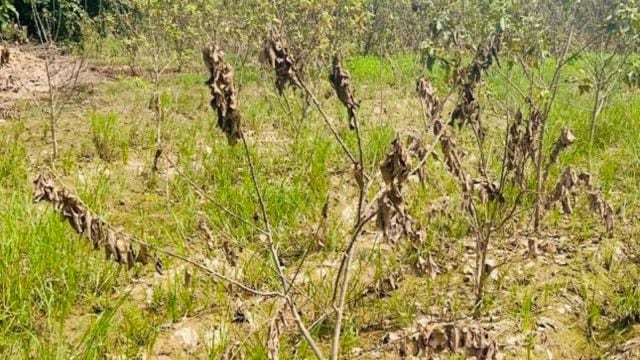Apples turn sour for this progressive farmer in Amritsar
It’s all investment, no support, says the young farmer who diversified from the traditional wheat-paddy cycle
 Dead apple plants (Express Photo)
Dead apple plants (Express Photo)In Aabadi Chandigarh village near Ramdas in Amritsar district, rows of apple saplings stand wilted in silence — a stark reminder of how the floods have crushed the hopes of one young farmer who dared to diversify.
Jagpreet Singh Dhillon, who gave up stubble burning over a decade ago and turned to sustainable farming, planted Punjab’s only apple orchard on three acres two years ago. He was counting down to his first commercial harvest next year. But when floodwaters rose seven feet and lingered for 20 days, his dream nearly drowned with it.
“There were 1,500 plants over about three acres. Around 500 small saplings died where water pooled and roots were deprived of air and light,” Jagpreet said, pointing to the shrivelled plants. “Older, two-year trees largely survived, though they showed stress. Leaves turned sour and yellow; many dropped.”
What weighs him down more than the losses is the absence of help. “I called the horticultural department again and again. They only kept giving me new mobile numbers. Assurances of visits never materialised,” he said. “Leaves of plants that survived are turning yellow. I want guidance on what to use to save them.”
For him, the contrast is glaring: local revenue officials quickly surveyed paddy losses but had “no rule book for apple orchard.” “They told me to contact the horticulture department,” he recalled bitterly. “The government keeps saying diversify, but when someone actually does, there is no support.”
Each apple plant cost him Rs 300, and he has already spent about Rs 15 lakh maintaining the orchard. “The orchard has not sold fruit yet, but income doubles or triples after the first crop,” he said. “An orchard is like an FD—you put in now and it pays after some years.”
The first two years were a learning curve. “Last year, bats damaged early fruit. At night they take bites. So I decided to put up lights like they use in pear and litchi orchards,” he said with a half-smile.
His orchard thrived unusually fast, which he credits to his decision to quit burning wheat and paddy straw a decade ago. “We never burned straw for 10-plus years. Our fields are very fertile and strong; people were surprised at how fast the orchard grew,” he said proudly.
When contacted, deputy director horticulture Tejinder Singh initially said he was unaware of any apple orchard in Amritsar. After checking with ground staff, he confirmed that Jagpreet’s orchard exists and assured that the department “will provide necessary support.” He added that around 160 hectares of pear orchards in the flood-affected belt had largely escaped damage as the fruit was harvested before the deluge.
For Jagpreet, the irony is hard to ignore. “For paddy and wheat, after all expenses, even one lakh can’t be saved from one acre. That is why I chose apples. But today, it feels like all investment, no support.”







